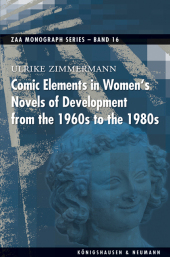 Neuerscheinungen 2013Stand: 2020-01-07 |
Schnellsuche
ISBN/Stichwort/Autor
|
Herderstraße 10
10625 Berlin
Tel.: 030 315 714 16
Fax 030 315 714 14
info@buchspektrum.de |

Ulrike Zimmermann
Comic Elements in Women´s Novels of Development from the 1960s to the 1980s
2013. 208 S. 235 mm
Verlag/Jahr: KÖNIGSHAUSEN & NEUMANN 2013
ISBN: 3-8260-5177-7 (3826051777)
Neue ISBN: 978-3-8260-5177-7 (9783826051777)
Preis und Lieferzeit: Bitte klicken
Women´s humour is a contested area, often perceived as transgressive, unseemly and unfeminine, or deemed non-existent in the fi rst place. In recent decades, feminist theory has undertaken a reappraisal and stressed the subversive potential of humour used by women. In a similar vein, the Bildungsroman, as a genre which traditionally delineated the development of men protagonists, was taken up, changed and assimilated by women writers in the course of its history. This study takes a close look at humorous Bildungsromane by women authors in the last decades of the 20th century. The focal points are the strategies of humour, which are employed to various means, often oscillating between subversive and affi rmative positions. In effect, feminist views stressing the innate subversiveness of women´s humour need to be re-assessed and the uneasy positioning of the comic in women´s writing acknowledged. Looking beyond national views of humour, the texts in focus are by British, Canadian and American authors.
Women s humour is a contested area, often perceived as transgressive, unseemly and unfeminine, or deemed non-existent in the fi rst place. In recent decades, feminist theory has undertaken a reappraisal and stressed the subversive potential of humour used by women. In a similar vein, the Bildungsroman, as a genre which traditionally delineated the development of men protagonists, was taken up, changed and assimilated by women writers in the course of its history. This study takes a close look at humorous Bildungsromane by women authors in the last decades of the 20th century. The focal points are the strategies of humour, which are employed to various means, often oscillating between subversive and affi rmative positions. In effect, feminist views stressing the innate subversiveness of women s humour need to be re-assessed and the uneasy positioning of the comic in women s writing acknowledged. Looking beyond national views of humour, the texts in focus are by British, Canadian and American authors.
Ulrike Zimmermann teaches British Literary and Cultural Studies at the University of Freiburg and is coordinator of the Research Training Group in the Collaborative Research Centre 948. Her research interests include seventeenth-century poetry and the contemporary British novel. She is currently working on her habilitation on popularisations of the eighteenth century.


